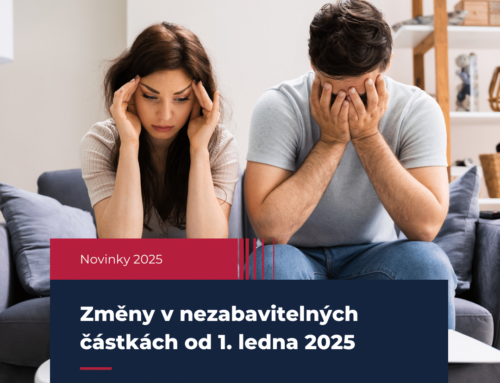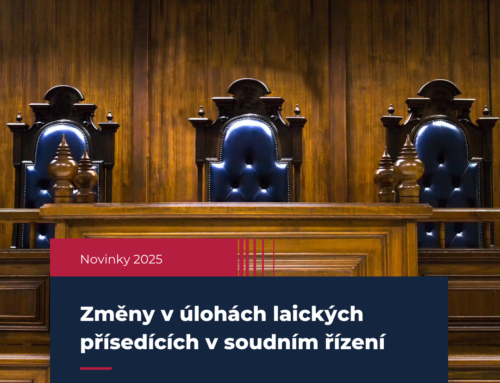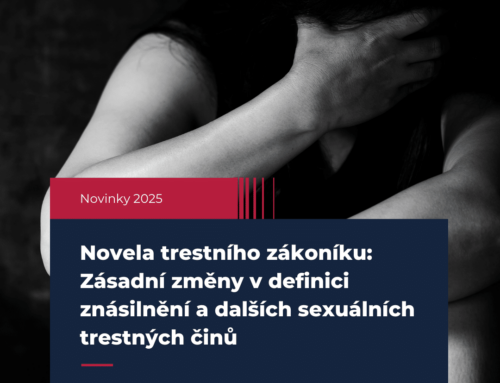Interviewing a child in court
In court proceedings for the care of minors, which include, inter alia, proceedings for the care, maintenance and access to the child, the child himself is a party alongside the mother and father. This also entails a number of procedural rights to which the child is entitled. In general, the courts must not treat the child, whatever his age or state of health, as a mere subject of the proceedings. Irrespective of the age of the child and the possibility that the parents may agree on his or her care, the court always appoints a representative for the child, a conflict guardian, who is usually the Child Social Protection Authority (OSPOD for short). However, it cannot be the OSPOD who has filed the petition with the court (this applies in cases where neither of the child's parents has filed a petition). The court must always inform the parties of the appointment of a conflict guardian by means of an order. The guardian protects the interests of the minor child in the proceedings and provides him with the necessary information if the age and mental maturity of the child permits. This includes, in particular, information on what is being decided in court, the purpose of the proceedings and the possible outcomes.
A basic prerequisite for the participation of a minor in the proceedings is the minor's ability to express his or her opinion on the matter. It is an essential right of the child in juvenile court proceedings to be heard. This right is enshrined in Article 12 of the Convention on the Rights of the Child, to which 196 states have already acceded, not excluding the Czech Republic. It is a fundamental right of the child which cannot be arbitrarily restricted. However, the application of this right is dependent on the child's intellectual maturity, since a toddler cannot, for example, be required to formulate his or her thoughts and opinions. The age of the child and the child's intellectual maturity are also related to the extent to which the court, the conflict guardian and the parents are informed of the proceedings.
The law generally provides for a presumption that a child over 12 years of age is capable of receiving information, forming his or her own opinion and communicating that opinion. However, this is not a strict limit, as the Constitutional Court itself has ruled that even a seven-year-old child is capable of expressing his or her opinion. For example, it could be an opinion on whether he likes school or what friends he has there. It is for the court to assess whether a child is capable of expressing his or her views on an individual basis. In this respect, it also depends on the nature of the child, as some children are naturally communicative and others are rather taciturn. However, giving evidence in court is a child's right and not an obligation.
The examination of the child may be proposed by one of the parties, i.e. typically by one of the parents, but may also be ordered by the court, as proceedings for the care of minors are uncontested proceedings in which the court may take evidence other than that proposed by the parties.
Interviewing a child can be done in several ways. One way to find out the child's opinion is to interview the child at the OSPOD. Although in general the courts should prefer to hear the child directly in court, in practice the courts often order the child to be interviewed by the OSPOD. Interviewing a child in court is referred to as interviewing a minor, but is very different from interviewing other parties. It is common practice that only the judge and the conflict guardian are present at the hearing, with the parents and their legal representatives waiting outside the courtroom. This is primarily to ensure that the child is not influenced and also that the interview is not psychologically burdensome for the child. It also happens that the judge removes his or her gown to question the child in order to give the child a more friendly impression, or takes the child into his or her office in order to create as friendly an environment as possible. The whole questioning is not confrontational, but rather informal, with the judge trying to find out what the child really wants. The child's opinion can also be obtained through an expert, usually in the field of psychology, if one has been appointed in the proceedings.

The child's opinion is an important consideration, but not the only one. It is not possible to take the child's opinion unquestioningly into a decision about his or her life, regardless of other facts. Rather, the child's established position on the matter is a guide to make a decision in the child's best interests. It is a matter of law that the court shall take into account the child's views having regard to his age and maturity of mind. The court must consider, in the light of the other evidence adduced, whether or not it is in the child's best interests to comply with the child's wishes and reflect all its considerations in the reasons for the final decision.
Interrogation of a minor in custody proceedings
(professional version)
Interviewing a minor is one of the basic acts to fulfil the minor's right to express his/her opinion on matters concerning him/her. Article 12(2) of the Convention on the Rights of the Child expressly provides that in any judicial or administrative proceedings concerning a minor, the minor should be given the opportunity to express his or her views on the matter.
The Constitutional Court ruled in 2021 that questioning a minor in proceedings in which he is a party is a sui generis act.1 In the opinion of the Constitutional Court, this is not an interrogation of a participant as such, but a way of ascertaining the child's opinion. An act aimed at ascertaining the child's opinion must be regarded as part of the child's participation rights, not as evidence. The questioning of the child does not primarily establish the facts, but the child's attitude to the matter in question. In the opinion of the Constitutional Court, for example, even a record of such an interrogation of a minor is not mandatory.
Why is finding out the child's opinion so important and why is it not always possible to decide on the basis of other evidence or questioning of parents? The child, although not fully capable of acting, must not be treated merely as an object to be decided by others. Nor can the child be placed in the position of a passive observer of events. The minor child, in particular, is an important subject of the law and a participant in the proceedings concerning him or her.2 International treaties and national law thus grant him or her a number of participation rights.
In spite of the above, it is not necessary to question a minor without further delay in every proceeding in which he or she is a party, as almost every lawyer or judge has encountered this in practice. First of all, the questioning of a minor must not be contrary to the minor's best interests. This condition already follows from the above-mentioned Convention on the Rights of the Child, as it stipulates that the best interests of the child must be the primary consideration in any action concerning children. The court must therefore examine whether it is not contrary to the best interests of the child to ascertain the child's views, including by asking questions relating to the proceedings in question. If it finds such a conflict, it is legitimate to limit the minor's right of participation with due justification. This may be the case, for example, where the court finds that hearing the minor before the court could have a negative impact on his or her psychological development.
Another aspect that the court must examine before proceeding to the actual questioning of the minor is the child's ability to properly take in the information and form his or her own opinion, which he or she would then be able to communicate. Logically, it is clear that the youngest preschoolers will not be capable of this. However, where the point is when a child can be expected to be able to formulate his or her own opinions anymore is not strictly given. The law generally establishes a presumption that a child over the age of 12 is capable of taking in information, forming his or her own opinion and communicating that opinion. However, this is a rebuttable presumption, and even a younger child is capable of doing so, and conversely an older child may not be, for example because of a disability (but more on this below).
The Constitutional Court has already dealt with cases in which it has found even a six-year-old child to be capable of expressing himself or herself on a matter that concerns him or her.3 If the court wishes to question a child, it is not absolutely necessary for the minor child to understand the whole situation, which is dealt with in a complex way in court, it is sufficient if he or she understands it enough to be able to express his or her views on it. Children with disabilities cannot be left out. These vulnerable children are also entitled to appropriate participation rights, and the questioning of a minor cannot be abandoned without further delay on the basis of information that he or she is mentally disabled, for example. The court must closely examine possible solutions to interview such a minor and inform him or her of the proceedings.4
However, the decision whether or not to conduct an interview is entirely within the court's discretion, as it is the court that decides the scope of the evidence needed to establish the facts of the case.5
It should be noted at this point that the child's right to express his or her opinion is only a right and not an obligation. The child must not only have the opportunity to comment on the situation, but also to say nothing and remain silent. The court must also give the child the opportunity to refuse to give evidence. This can happen, for example, if the child does not want to be part of the conflict between the parents. A child cannot be forced to give a statement at any age, but should only be given the opportunity to comment on the matter.6
The child's opinion can be ascertained, in addition to questioning in court, through a representative, an expert opinion or the competent authority for the social and legal protection of children. Although the law provides that the child's opinion may be ascertained in this way in exceptional cases, in practice an interview with the OSPOD is a very common way for the court to ascertain the child's position on an issue before the court. At the same time, settled case-law also makes it clear that it is only in the child's best interests to seek the child's views by means other than directly in court, and such a procedure must always be duly justified.7
If the court concludes that it is necessary to bring in an expert to answer a technical question, it can also obtain the child's opinion. An expert is usually brought in when it is suspected that someone involved is suffering from a mental or physical disorder or when the situation is unclear. These are in most cases situations where the parents are unable to reach an agreement.8 In principle, the expert will be a psychological expert. Such a psychologist should ascertain the child's true opinion, not one influenced or taken from one of the parents.
The above mentioned ways of ascertaining the child's opinion in a given proceeding should be used especially for younger children, as a child over 12 years of age should normally already be questioned directly in court. If the child is at least 15 years of age, the court is even obliged to serve the child personally, rather than through a representative, thus extending the child's rights of participation. Personal questioning in court is also preferable because the child is questioned by the person who then makes the decision on the merits. There is thus less misinterpretation than when the child gives his or her opinion to a guardian or expert who then 'translates' it to the court. Thus, the court may interpret the information given by the expert or guardian differently from how the child intended it.
If the court orders the examination of a minor before the court, it may be carried out without the presence of the parents, their legal representatives or other persons if the court considers that their presence might influence the minor's testimony, where he or she might not express his or her true opinion. The court is also not obliged to interview the child in the courtroom, as it may choose a less formal setting, which may be, for example, the judge's chambers. The judge may also visit the child in a familiar setting such as a school. These measures, among other things, make the interview less burdensome for the child. The judge should also conduct the entire interview with the child, not as a confrontational interview, but rather as an informal discussion of the subject matter. It is certainly not desirable for the child to stand 'behind the fence' during the interview and be afraid to speak. However, the child may have a confidant who is not his/her legal representative with him/her during the interview if he/she so requests. The presence of such a confidant may be excluded by the court only if it would defeat the purpose of the interview. The child must understand what the judge is asking him or her, which the judge should ensure.
Personally, we most often encounter the practice of the courts where the judge sends the parents and their legal representatives to the hallway of the court, removes the gown and interrogates the child in the courtroom only in the presence of the guardian.
However, the exercise of the minor child's right to be heard should not be focused solely on the questioning itself. On the contrary, the following 5 steps should be taken. The preparation, the hearing itself, the assessment of the child's capacity, informing the child of the attention given to his/her views and the remedies. The preparation should consist, among other things, of informing the child of his or her right to make a statement, as described above, which should include the information that the child does not have to make a statement if he or she does not want to. It is also important to inform the child of the impact that his or her statement will have on the outcome of the proceedings.
With regard to the course of the interrogation itself, the Constitutional Court stated that it is not possible to ask only direct, brief questions, but it is necessary to examine the child's wishes comprehensively through a series of indirect questions.11 This procedure is all the more important for younger children.
In view of the above conclusion of the Constitutional Court that there is no need to make a record of the interview of the minor, any defence of the other parties against possible inconsistencies in the decision and the child's opinion is rendered unavailable. Parents and other parties are thus only referred to what the court tells them, where it is usually a mere summary of what the minor has testified.
In its decision on the merits of the case, the court shall take into account the child's views, in particular with regard to his or her age. In general, the older the child is, the more weight the court gives to his or her opinion, and the opinion of minors approaching the age of majority cannot be disregarded.12 These conclusions do not, of course, mean that the opinion of a young child would be disregarded. The opinion of the child must be given due weight by the court. However, the child's opinion cannot be taken into the decision without further consideration, i.e. the decision cannot be based solely on the child's wishes. On the contrary, the court must carefully and comprehensively evaluate all the evidence adduced and weigh it against the best interests of the child.13
The child should also be informed of the outcome of the procedure, and be told how his or her views have been taken into account. Only then can he or she have legitimate access to remedies.14
Mgr. Lucie Jindrová, law clerk
1. Resolution of the Constitutional Court of the Czech Republic of 18.10.2021, file no. II. ÚS 1845/21
2. Ruling of the Constitutional Court of the Czech Republic of 15 November 2023, Case No. III ÚS 1068/22
3. Ruling of the Constitutional Court of the Czech Republic of 9 January 2018, Case No. IV ÚS 3749/17
4. Ruling of the Constitutional Court of the Czech Republic of 15 November 2023, Case No. III ÚS 1068/22
5. Resolution of the Constitutional Court of the Czech Republic of 20 June 2023, Case No. I. ÚS 1096/23
6. Ruling of the Constitutional Court of the Czech Republic of 28 February 2018, Case No. II. ÚS 2866/17
7. Ruling of the Constitutional Court of the Czech Republic of 7 September 2023, Case No. II ÚS 1192/22
8. PAVLÁT, Josef, MATOUŠEK, Oldřich. Custody expert opinions - recommendations, objections, pitfalls. Čes a slov Psychiat 2016; 112(2).
9. Ruling of the Constitutional Court of the Czech Republic of 28 February 2018, Case No. II. ÚS 2866/17
10. Ruling of the Constitutional Court of the Czech Republic of 8 October 2018, Case No. II. ÚS 725/18
11. Ruling of the Constitutional Court of the Czech Republic of 18 December 2014, Case No. I. ÚS 1708/14
12. Ruling of the Constitutional Court of the Czech Republic of 15 August 2022, Case No. II ÚS 1626/22
13. Ruling of the Constitutional Court of the Czech Republic of 15 August 2022, Case No. II ÚS 1626/22
14. Ruling of the Constitutional Court of the Czech Republic of 8 October 2018, Case No. II. ÚS 725/18





